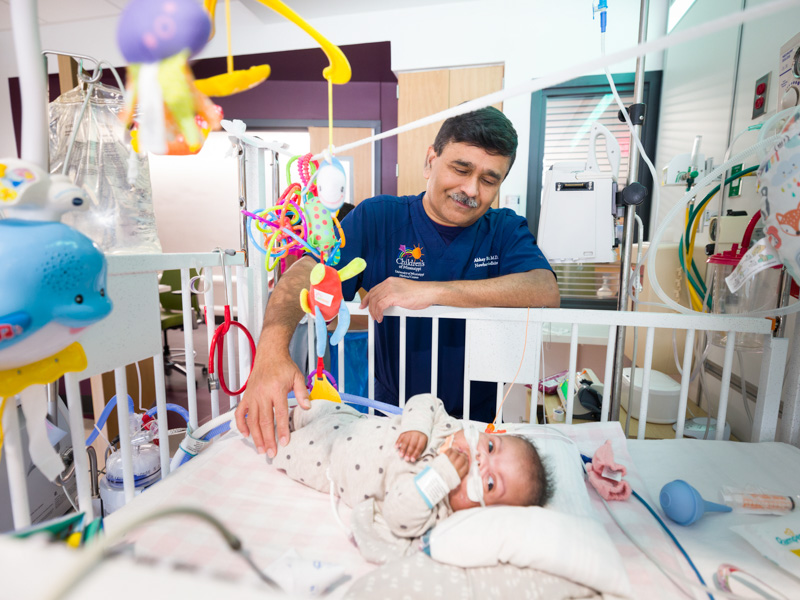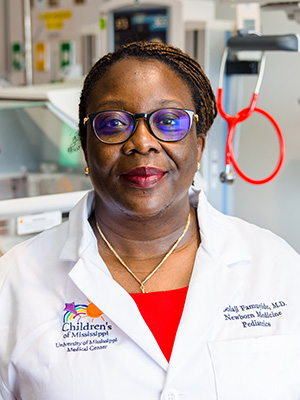UMMC awarded NIH funding to help improve newborn health outcomes

The University of Mississippi Medical Center has been selected to join a network of medical centers studying ways to improve health outcomes for newborns.
As part of the Neonatal Research Network, UMMC will work with 14 other centers across the country over the next seven years to conduct collaborative, multi-site clinical trials and observational studies on newborn infants, providing evidence to guide clinical practice.
The network is funded by the Eunice Kennedy Shriver National Institute of Child Health and Human Development, part of the National Institutes of Health.
The Medical Center will receive nearly $2.1 million in funding.
“UMMC has received international recognition by joining this group of other reputed academic centers across the US,” said Dr. Abhay Bhatt, professor of pediatrics and director of research in the Division of Neonatology, and the study’s principal investigator.
Other network members include Duke University, Emory University, Stanford University and Cincinnati Children’s Medical Center.
“Our faculty and trainees will get the opportunity to collaborate with their counterparts in other institutions, and our scientists, in collaboration with our newborn faculty, will get the opportunity to develop funded translational research studies involving newborns,” said Bhatt.
Dr. Mobolaji Famuyide, chief of pediatric neonatology and alternate principal investigator, supported Bhatt through the competitive process of joining the network, which required the interdisciplinary teamwork of many.

“Having our division in the NRN is a dream come true,” said Famuyide. “In Mississippi, we serve a unique population with significant health care needs and who are underserved.
“This allows this cohort to benefit from novel medical interventions and practices and to contribute to neonatal literature. It also affords our junior faculty with a desire for a research career the opportunity to be involved in NIH-funded studies and the prestige that comes with that.”
The network, formed in 1986, will continue to conduct randomized controlled trials of unproven or promising therapies and observational studies of newborns most at risk, said Bhatt.
Ongoing observational studies UMMC will participate in include a follow-up of infants born at 22 to 26 weeks and a survey of morbidity and mortality in very low-birth weight infants. One of several ongoing clinical trials is studying whether treating early preemies with only 15 minutes of phototherapy per hour can adequately control bilirubin levels compared to continuous phototherapy.

This is a “monumental achievement” for UMMC, said Dr. Courtney Walker, assistant professor of psychiatry and follow-up principal investigator, as is Mississippi’s representation in the network.
“We have the highest preterm birth rate in the country, and being a part of the NRN gives infants and their families the opportunity to be a part of cutting-edge treatment and management strategies that they may not have access to otherwise.”
As follow-up PI, Walker, lead psychologist in the Newborn High-Risk Follow-Up Clinic, where neurodevelopmental assessments are conducted, will oversee the collection of outcome measures after discharge.
The NIH formed the network for a couple of reasons. At the time, many newborn treatment and management strategies that had become standard were not being properly evaluated. To create a population large enough for adequate samples to be drawn, multiple clinical centers were needed.
The network of clinical centers, along with a data coordinating center, allows for rigorous evaluations of large samples and rapid results that would not be possible with only one center.
The NRN has published more than 470 scholarly articles that have helped guide clinical practice, including the use of hypothermia to treat birth asphyxia in term infants and Vitamin A to reduce the risk of chronic lung disease and sepsis in premature babies.
“Our population has been historically underrepresented in this level of research, which is problematic because, typically, the NRN sets the standard for NICU treatment and management strategies,” said Walker.
“Given that a lot of our babies are born premature in Mississippi, it is critical to study these new techniques here so that we can help determine whether or not they would benefit our children.”


